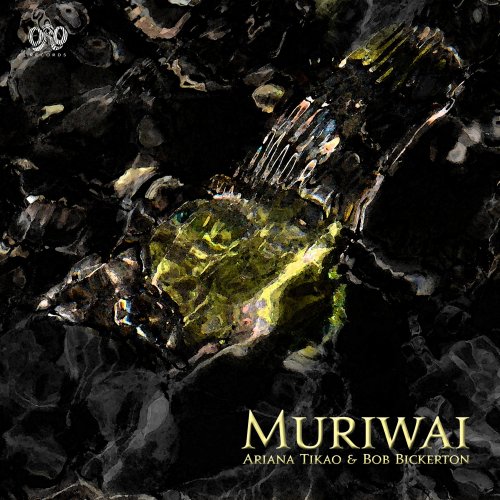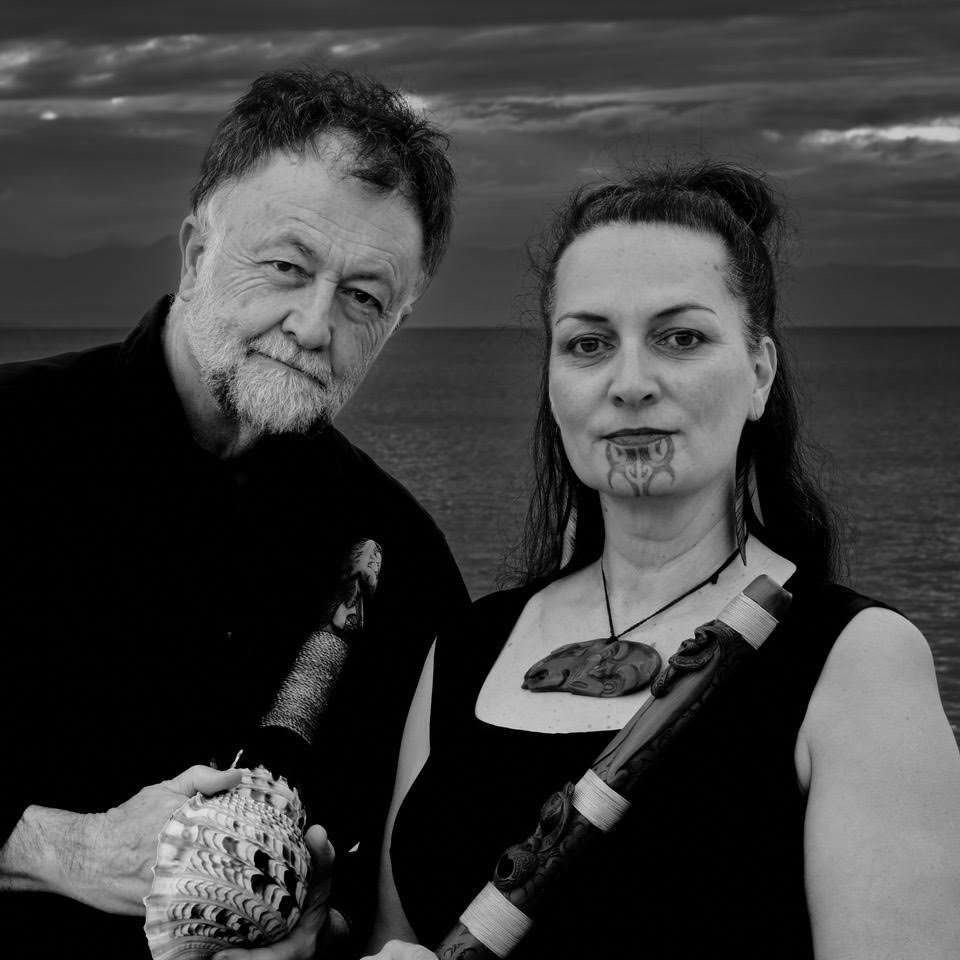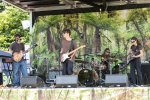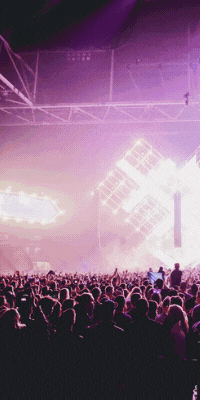Muriwai - Muriwai - Album Review: Muriwai

Muriwai is the latest undertaking by Bob Bickerton and Ariana Tikao, a new and greatly anticipated collaboration in Aotearoa’s world of traditional music. Bob is a highly influential sound engineer, performer, educator, a Member of the New Zealand Order of Merit for services to music, and composer who has worked in the New Zealand music industry for almost 50 years. Ariana is an acclaimed writer, musician and singer who often incorporates the use of taonga puoro, Maori musical instruments, in her performances and recordings, and bases her compositions on experiences as a wahine of Kai Tahu descent.
Full disclosure, my Te Reo Maori vocabulary is so-so, and I have yet to spend more time with the language. Thus, in writing this, I’ve had to look up certain words in dictionaries (online and book-form!) so I apologise in advance for any errors or inaccuracies.
The way I understood it, the Te Reo word 'Muriwai' means the end, or the meeting, of rivers. This makes the title of the album particularly fitting, not solely because of the record’s theme of water, but as a literal confluence of Ariana and Bob’s experiences, abilities and mahi, culminating in this very listening experience.
This journey starts with Wai, suitably, the Te Reo word for water. Soothing sounds of a flowing stream are set beneath a verbal introduction, first in English and then in Te Reo, describing the ancient water-filled world at the beginning of time according to Kai Tahu legends.
And in continuation of this introduction, Whakamihia greets listeners with wondrous harp notes, shimmering vocal harmonies and bright sounds of a traditional flute.
With both Bob and Ariana being professional taonga puoro performers, I have no doubt both had turns at all the various instruments across the eleven tracks. And there are plenty of native Aotearoa instruments on this record.
Putatara conch horns can be heard on Terea Te Waka as well as on Te Ao Patupaiarehe, and there are various flute-like parts - the individual names of which I’m not yet familiar with - employed on every other composition.
There are brilliant uses of a purerehua, the whirled instrument, like on Auroko, where the low hums punctuate the heartfelt yet beautiful verses.
Where featured, Bob’s harp strings accentuate each piece, providing both tone and atmosphere, as heard on Te Ao Takata and Auroko.
But what makes certain waiata feel most emotive is Ariana’s vocal work. At many moments on the record it’s the sustained, bittersweet notes sung that carry the heft of the composition. The expansive quality of Ariana’s voice on Te Ao Takata feels like it could be heard from one end of the motu to the other.
The standout tracks, to my ears, are ones that portray an environment by way of sound effects and audio recordings of the natural world. Ngahere is one particular waiata that feels particularly transcendental because of this. Appropriately, the Te Reo word for bush or forest is indeed 'ngahere', and your mind is transported into the densest native bush. With a log-fire lit, as rain falls all around, you’re serenaded with birdcall, and Ariana’s expressive, far-reaching notes echo like you’re sheltering in a deep valley.
Pupuhi Rau takes a somewhat similar approach, except in place of birdsong and rainfall, there are deep rumbles, and distant, gently percussive sounds of stalactites dripping. Seeming to reproduce a subterranean setting, Ariana’s long, soulful notes make you feel as if you’re being sung a lullaby inside a cavern. I hadn’t heard anything so mentally visual for a long, long time and it’s absolutely magical.
There is another quality to this record that I personally have not encountered often, if at all. It’s the meditative and entranced state of mind one gets from hearing the entire album from start to finish, then listening all over again, like a story that never ends. This could make for the perfect accompaniment to sit and meditate to, or even do yoga to (Not that I’ve ever attempted yoga).
Both humbling and introspective, Muriwai is a subdued form of celebration. It acknowledges and celebrates the revival of Te Reo Maori, the revival of taonga puoro, and applies a twist of Kai Tahu lore.
This is nothing short of a fascinating listen, and I believe this to be a brilliant highlight in the cosmos of Aotearoa music.
About Muriwai

The name refers to a confluence of two rivers, and their music is a convergence of Maori and Celtic musical traditions through Celtic harp, vocals, and they have developed a show and album which journeys through time and place starting with a Kai Tahu creation story relating to water, through to the arrival of people in Te Waipounamu, our impact on the environment, and imagined consequences of our actions.
Visit the muzic.net.nz Profile for Muriwai
Releases
Other Reviews By Steve Shyu
 Mt Eden - EP Review: Venom
Mt Eden - EP Review: Venom
24 Dec 2024 // by Steve Shyu
Anyone who knows anything about Aotearoa electronic music will be very familiar with the name Jesse Cooper. Or as he’s better known, Mt Eden - Formerly Mt Eden Dubstep.
Read More...
 Zuke - Album Review: Come Closer
Zuke - Album Review: Come Closer
16 Dec 2024 // by Steve Shyu
Ed Zuccollo, stage name Zuke, is a renowned producer and master of synthesisers based in Whanganui-a-Tara Wellington. He’s also known for his work with the likes of Trinity Roots, is also a member of KITA, and has made marks in his solo DJing career, performing at festivals such as Northern Bass, Splore, KiwiBurn, AUM and loads more.
Read More...
 Jacob Blair Tait - EP Review: Our Great Nation
Jacob Blair Tait - EP Review: Our Great Nation
24 Nov 2024 // by Steve Shyu
You wouldn't be able to guess what sort of music you’re in for just by looking at the cover artwork. Hues of aquamarine and purple dominate, and in the centre, an artistic rendering of a million marching soldiers bearing flags, albeit created using AI.
Read More...
28 Oct 2024 // by Steve Shyu
DougFest is back. Bigger, bolder, and heftier than the first.
Read More...
 Fan Club - EP Review: Towards The Sun
Fan Club - EP Review: Towards The Sun
09 Jul 2024 // by Steve Shyu
2024 is set to be another monumental year for Tamaki Makaurau’s Fan Club. Just last year they claimed a multitude of awards, including the top prize at Raise Up’s New Found Sound, and placing first in the Auckland Central Final of the SmokeFree RockQuest.
Read More...
 Havening - Double Album Review: Wavelengths of Light
Havening - Double Album Review: Wavelengths of Light
26 May 2024 // by Steve Shyu
Big things are happening for Bonnie O'Donnell. Under her alias of Havening, she’s been eagerly crafting bucketloads of electronic music, releasing them all as not one, but two albums.
Read More...
18 Mar 2024 // by Steve Shyu
With nothing of last night's rainstorm in sight except puddles in the asphalt, the sun warmed the air to counter the day's cold breeze. There was plenty of talk of a cold snap on the way, but I was confident my tee and hoodie combo would suffice.
Read More...
 EP Review: PHNX
EP Review: PHNX
11 Mar 2024 // by Steve Shyu
Aotearoa, look out for a rising star on the horizon.Under his stage name PHNX, 18-year-old singer-songwriter and producer Phoenix Simpson has released his self-titled debut EP and it’s a gem.
Read More...
Most Viewed Artists
Latest Galleries

Evan Rhys & the Stereo Streets @ Festival of Lights - Pukekura Park, New Plymouth - 18/01/2025
Midwave Breaks @ Festival of Lights - Pukekura Park, New Plymouth - 18/01/2025
Rumpus Machine @ Music in Parks, Aotea Square, Auckland - 18/01/2025
Fan Club @ Music in Parks, Aotea Square, Auckland - 18/01/2025
NZ Top 10 Singles
- APT.
ROSÉ And Bruno Mars - DIE WITH A SMILE
Lady Gaga And Bruno Mars - BIRDS OF A FEATHER
Billie Eilish - TASTE
Sabrina Carpenter - I LOVE YOU, I'M SORRY
Gracie Abrams - ESPRESSO
Sabrina Carpenter - SAILOR SONG
Gigi Perez - LOSE CONTROL
Teddy Swims - A BAR SONG (TIPSY)
Shaboozey - GOOD LUCK, BABE!
Chappell Roan





 Report A Problem
Report A Problem

